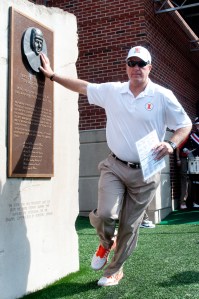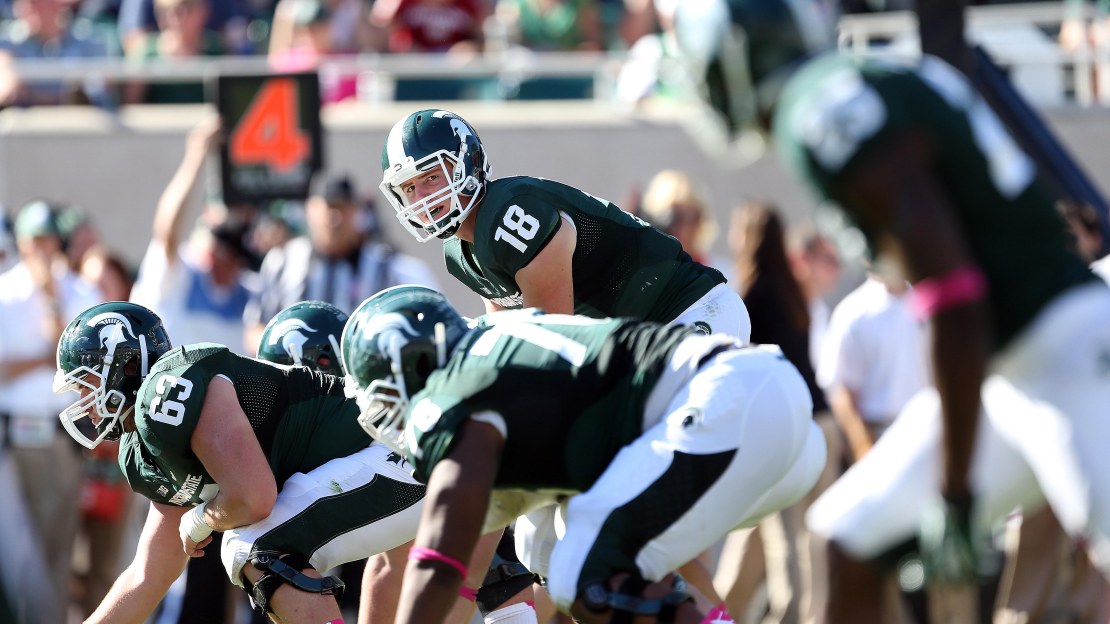Tom Dienhart, BTN.com Senior Writer, February 14, 2014
The college football world is abuzz with the recent NCAA Football Rules Committee proposal to recommend a change that will allow defensive units to substitute within the first 10 seconds of the 40-second play clock, with the exception of the final two minutes of each half, starting with the 2014 season.
Some think the rule is horrible, that it is intended to slow down these exciting spread/no-huddle offenses that work at a fast pace. Schools like Oregon and Texas A&M are among the best at running such offenses. In the Big Ten, Kevin Wilson has made Indiana competitive with a fast-paced attack. Other Big Ten schools sometimes feature offensive packages that work at a quick tempo. It?s about getting an edge.
If passed, this rule could tap the brakes on these attacks that have become among the most exciting and popular in college football. The crux behind the change: player safety.
?If they show data that the change is for player safety, then I am all for it,? said Illinois offensive coordinator Bill Cubit. ?But I don?t see it.?
Seth Littrell, who ran the fastest offense in the Big Ten while coordinating Indiana?s offense before leaving for the same post at North Carolina, echoes Cubit?s thoughts.
?We can talk player safety all we want,? said Littrell. ?But I don?t think it?s about player safety. It has to do more with certain coaches don?t like the fact they have to make play calls. The ones wanting to change the rule are the coaches who can?t defend it.?
Michigan State defensive coordinator Pat Narduzzi has been among the best in the nation at slowing down these hyper-speed offenses. If he can do it, why can?t other coordinators?

?We are gonna out-condition those offenses,? he said. ?If that?s what you want to do, it?s our job to coach against. If coaches don?t understand how to stop it, they need to clinic and find out how to do it.?
But Narduzzi can see both sides of the argument. He sees an accumulative effect that speeding up the game can have, thus leading to player safety concerns.
?Six or seven years ago, we went from 11 to 12 games,? he said. ?Now, you have a title game. We played 14 this year. If we are lucky, we?ll play 15 next year. That?s an NFL schedule. We are talking about 18-, 19-, 20-year olds. What?s the long-term effect on these athletes if they have to play a lot of these fast-paced offenses in a season on top of playing an extended schedule? That?s a lot of extra plays. That?s a lot of wear and tear on them. It?s not a one-game safety issue. It?s about the total, accumulative impact.?
Wisconsin special teams coordinator/tight ends coach Jeff Genyk used to run a ?warp speed? offense when he was head coach at Eastern Michigan from 2003-08.
?When you watch hurry-up offenses, it?s very rare that the ball is snapped with 31 or 32 seconds left,? Genyk said. ?I think 95 percent of the plays are snapped with 30 seconds or less on the play clock. If that?s true, it won?t have much of an impact.
?If you want to get a play off as fast as you can, you have to stay in the same formation and personnel group. And if you want to flip your receivers, it?s hard to get a play off in eight or nine seconds. Maybe once or twice in my career I have seen a team get a play off in 33 seconds. But it?s very rare.?
Regardless, the issue of fast-paced offenses is such that it has gotten to the point where legislation is on the table that could alter their effectiveness.
?This rules change is being made to enhance student-athlete safety by guaranteeing a small window for both teams to substitute,? said Air Force head coach Troy Calhoun in a statement. He is chair of the committee. ?As the average number of plays per game has increased, this issue has been discussed with greater frequency by the committee in recent years and we felt like it was time to act in the interests of protecting our student-athletes.?
Still, a change like this could impact the competitive balance in college football.
?Everyone is fighting for an edge,? said Cubit. ?The defensive guys want to knock it down a little. The offensive guys don?t. The game is all about finding an advantage. And the offensive guys found an edge by playing a bit faster. And teams that aren?t as talented, that?s how they get their edge to level the playing field. Not everyone has the same resources as Alabama or USC, people like that. Some of the teams are competing now because of this offense.?
Stay tuned. It will be interesting to see if this change is adopted.
***
| About Tom Dienhart | BTN.com senior writer Tom Dienhart is a veteran sports journalist who covers Big Ten football and men's basketball for BTN.com and BTN TV. Find him on Twitter and Facebook, read all of his work at btn.com/tomdienhart, and subscribe to his posts via RSS. Also, send questions to his weekly mailbag using the form below and read all of his previous answers in his reader mailbag section. |
And if you want to leave a comment on this post, use the box below. All comments need to be approved by a moderator.







 Check out what's coming up next live on B1G+.
Check out what's coming up next live on B1G+. 